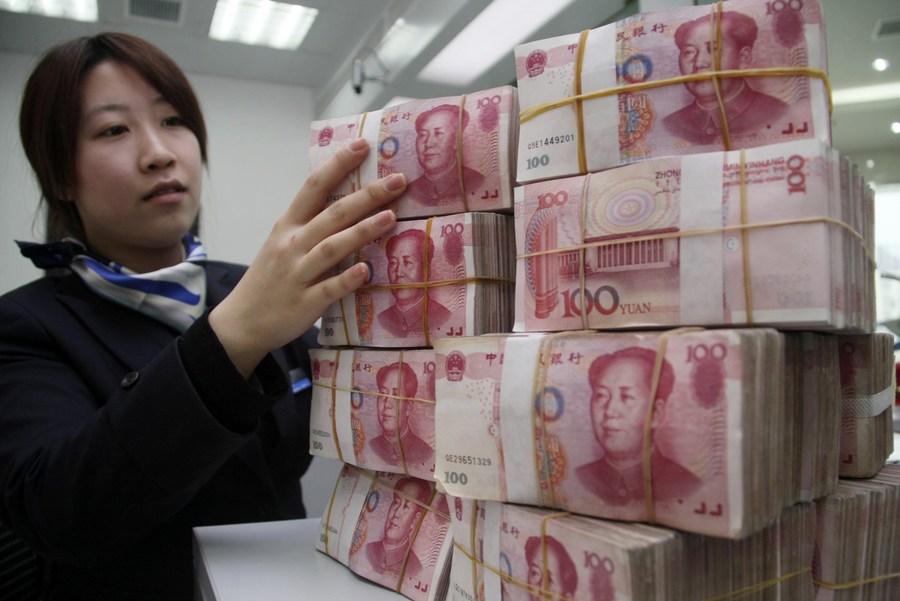China sure of preempting fiscal risks

File photo shows a clerk counts RMB bank notes in a bank in Nantong, East China's Jiangsu province. [Photo/Xinhua]
Finance minister says uneven local govt debt will be tackled to protect recovery
China is capable of preempting systemic fiscal risks, Minister of Finance Liu Kun said on Wednesday.
China's government debt to GDP ratio was about 50 percent last year, a relatively low level by global standards, Liu said.
However, the distribution of local government debt in the country is uneven, with some regions having higher debt risks and greater pressure to repay principal and interest, Liu said at a news conference held by the State Council Information Office.
"We have already urged relevant local authorities to take primary responsibility and effectively defuse government debt risks to ensure that no systemic risks arise," he said.
As China has optimized its COVID-19 containment policies and has been making continuous efforts to provide a package of economic stabilization policies and follow-up measures, which are taking effect, the overall Chinese economy is expected to recover this year, and the local fiscal situation is expected to improve gradually, he said.
However, it should also be noted that the foundation of China's economic recovery is not yet solid, and there is uncertainty in fiscal revenue this year, he said.
Last year, local governments' general public budget revenue reached 10.88 trillion yuan ($1.58 trillion), up 5.9 percent year-on-year after deducting the factor of value-added tax credit refunds. Local governments' general public budget expenditure was 22.5 trillion yuan, increasing by 6.4 percent from the previous year. The overall local finance is running smoothly, Liu said.
In 2023, essential expenditure, including that on key technology research and development programs, rural vitalization and ecological protection, will continue to increase. Weak links in basic livelihoods such as pensions, education and healthcare need to be further strengthened.
It is also necessary to support coordinated regional development and maintain the necessary intensity of central government transfer payments made to local governments, Liu said.
"Although the contradiction between fiscal revenue and expenditure will still be prominent in 2023, we will not step back on expenditure on people's livelihoods. We will do our best to continue increasing investment in people's livelihoods according to our capability," he said.
One of the major tasks for this year is to implement the "employment first" strategy. The Ministry of Finance will use central government employment subsidy funds to support job creation. It will help key groups such as college graduates, migrant workers, people lifted out of poverty and veterans to find jobs or start their own businesses. At the same time, the ministry will also continue to support vocational training, he said.
Xu Hongcai, vice-minister of finance, said China will step up the proactive fiscal policy and increase policy effectiveness this year.
The annual Central Economic Work Conference in mid-December stressed the optimization of a combination of fiscal policy tools, including deficit, special bonds and interest subsidies, to safeguard fiscal sustainability and ensure that local government debt risks are controllable while effectively supporting China's high-quality development.
The Ministry of Finance will implement the conference's decisions in letter and spirit, reasonably arrange the scale of special bonds, and ensure that government investment will remain unabated, Xu said.
In 2023, China will expand the key areas of funds to be invested based on the existing 11 areas of projects, and continue to strengthen the implementation of key projects to boost investments and effectively support high-quality development. These tasks will be deployed subsequently, Xu said.
Last year, China's general public budget expenditure rose 6.1 percent year-on-year to 26.06 trillion yuan. The country will increase government spending appropriately this year, Liu said.
In addition, the government will further improve tax and fee reduction policies, with a focus on giving support to micro, small and medium-sized enterprises, self-employed businesses and industries in dire straits, Liu said.
Photos
Related Stories
- Tepid revenue increase won't hurt spending
- China unveils measures to secure fiscal support for construction of national parks
- China to continue proactive fiscal policy in H2
- More targeted policies in pipeline to boost growth
- China unveils multiple fiscal policies to support virus-hit sectors
- More macro measures seen
- Highlights of China's fiscal, taxation development in past decade
- 10 years on, China makes bigger fiscal 'cake' in staunch push for sound economic growth
- China's fiscal revenue up 8.6 percent in Q1
- China's fiscal revenue exceeds 20 trln yuan in 2021
Copyright © 2023 People's Daily Online. All Rights Reserved.









